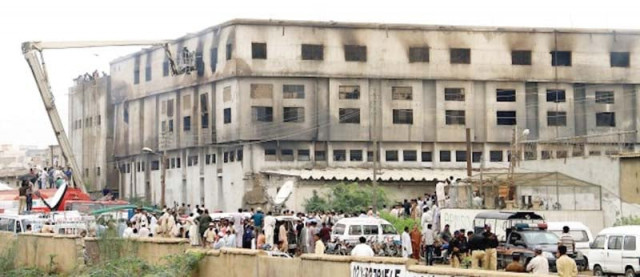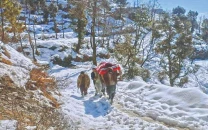Baldia victim relives the deadly fire that has haunted him since
The account will be part of a testimony against the German buyer of Ali Enterprises

The Baldia factory fire was one of the worst industrial disasters of the country but three years on, those responsible have still not been held accountable. PHOTO: FILE
The blood drains out of his face. His breathing grows strained. The events that unfolded on the night of September 11, 2012, have scarred Saad* for life. He pulls out an inhaler and puffs deeply. And yet, he is grateful that his scars are almost only psychological. Around 259 of his peers and fellow-workers at the Baldia factory died in the episode — their bodies charred beyond recognition.
Recalling the ordeal is the hardest for Saad. It may be survivor's guilt; or the fact that he has to relive details of that fateful night. The interviewer, Carolijn Terwindt, asks him to take some rest. She looks at him morosely, feeling sorry for him.
Are we waiting for another Baldia tragedy?
Terwindt has come all the way from Germany to Pakistan to meet those who were affected by the fire at Ali Enterprise — a garment factory where 259 labourers were burned alive due to poor working conditions and a lack of safety arrangements.
Pitch black
Saad was one of the workers at the factory. Luckily, he survived but with a crippled leg. He managed to escape by jumping off the mezzanine floor. "It all happened so quickly that no one even had time to realise what was going on," he recalls.
"Clouds of thick smoke started filling the factory floor and suddenly the power was cut off. There was a complete blackout then," he describes to Terwindt as she records the testimony.
Baldia tragedy: Families of deceased to sue German retailer KiK
"On the floor, there were around 700 to 800 workers present that day. Screams of 'Bachao, Bachao' echoed through the three-storey building. But nothing could be seen clearly except for shadows." Covering his mouth and nose with a scarf, Saad had rushed towards the door.
Unable to see anything, he tripped thrice. As he neared the door, a shout pierced his ears. The screams were of his co-workers lying on the ground, crying in pain as others ran over them in search of an exit. The gate was locked. Clawing at it in desperation were dizzying workers, falling to the floor as their smoke-filled lungs gave away.
Desperate for an escape
"We started choking as if there was some poisonous gas leak. Getting up on the palm of my hand, I saw some light at the far end. Tumbling, coughing, I rushed towards it," he recalls. Terwindt presses her lips and raises her eyebrows at the horrifying details.
Baldia factory fire caused by extortionists: JIT
The light was coming through a window bolted shut with iron bars and a thick net nailed around it. Initially, he tried to use his hands to prow open the netting and iron rods. When that didn't work, he sought the help of three other men to break it open by striking it with a heavy machine. Finally, they managed to break through.
"We felt that the fire was rolling on the floor, reaching towards us. We were nearly caught by it before we jumped out of the building and landed into the bushes," he describes.
Jumping to safety
One after another, scores of labourers jumped out of the window, falling on top of each other. Saad was at the bottom of the pile before somebody pulled him out. "I was screaming in pain. My whole right leg and hip bone were broken into pieces."
Baldia factory fire: Three years, as many reports and the trial goes on
Terwidnt expresses her grief to console him. She, then, asks him some details that are necessary to ascertain the cause of the fire. "There was no fire alarm or any emergency exit at the factory. There were fire extinguishers, but none of the workers knew how to operate them," he replies.
The German activist is counter-checking an audit report of Ali Enterprises produced by a foreign company. The report had cleared the factory for having all necessary arrangements and ensuring labour rights. "All that is written in the audit report would seem utopian to us because we never saw any such thing at the factory," adds Zain, another survivor.
The audit report said there were around 300 employees working at the factory. According to the survivors' account, there were no less than 1,500 workers. The workers were not given any target, stated the audit report. On the other hand, the workers described that they had huge targets. "We were ordered to complete it, even if working hours were over," says Zain, adding that those who refused to work beyond the shift timings were fired immediately.
Baldia fire: JIT off to London to record factory owners’ statements
Holding accountable
According to Terwindt, the purpose of recording their statements is to prepare a case against the buying agent of Ali Enterprise because it too was involved in the destruction. KiK, a German retailing giant, had a long-time working relationship with the ill-fated factory and according to some sources, it was its sole buying agent.
The buyer worked with a company where workers were kept in inhumane conditions, she asserts, saying that the liability lies on it too.
Apart from the cases pending before the courts in the country, a similar case demanding an apology, a pledge to never exploit labourers and compensation to the heirs of the victims has been filed against the buying agent in the high court of Dortmund. The case has been accepted by the court and is fixed for an oral hearing in March, next year.
*Names have been changed to protect the identities of the survivors
Published in The Express Tribune, October 27th, 2015.



















COMMENTS
Comments are moderated and generally will be posted if they are on-topic and not abusive.
For more information, please see our Comments FAQ